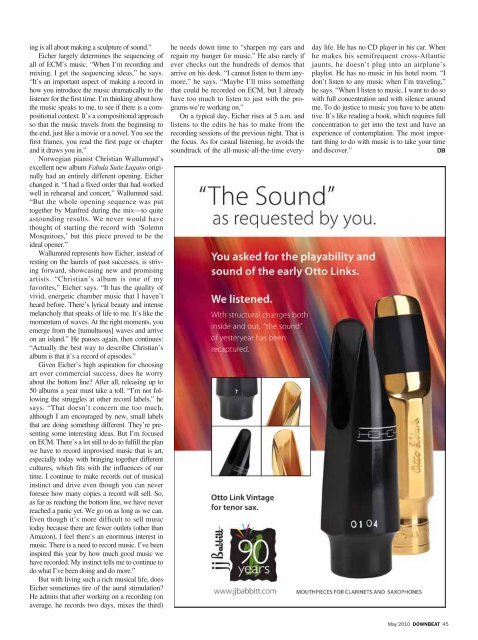Download - Downbeat
Download - Downbeat
Download - Downbeat
- No tags were found...
You also want an ePaper? Increase the reach of your titles
YUMPU automatically turns print PDFs into web optimized ePapers that Google loves.
ing is all about making a sculpture of sound.”Eicher largely determines the sequencing ofall of ECM’s music. “When I’m recording andmixing, I get the sequencing ideas,” he says.“It’s an important aspect of making a record inhow you introduce the music dramatically to thelistener for the first time. I’m thinking about howthe music speaks to me, to see if there is a compositionalcontext. It’s a compositional approachso that the music travels from the beginning tothe end, just like a movie or a novel. You see thefirst frames, you read the first page or chapterand it draws you in.”Norwegian pianist Christian Wallumrød’sexcellent new album Fabula Suite Lugano originallyhad an entirely different opening. Eicherchanged it. “I had a fixed order that had workedwell in rehearsal and concert,” Wallumrød said.“But the whole opening sequence was puttogether by Manfred during the mix—to quiteastounding results. We never would havethought of starting the record with ‘SolemnMosquitoes,’ but this piece proved to be theideal opener.”Wallumrød represents how Eicher, instead ofresting on the laurels of past successes, is strivingforward, showcasing new and promisingartists. “Christian’s album is one of myfavorites,” Eicher says. “It has the quality ofvivid, energetic chamber music that I haven’theard before. There’s lyrical beauty and intensemelancholy that speaks of life to me. It’s like themomentum of waves. At the right moments, youemerge from the [tumultuous] waves and arriveon an island.” He pauses again, then continues:“Actually the best way to describe Christian’salbum is that it’s a record of episodes.”Given Eicher’s high aspiration for choosingart over commercial success, does he worryabout the bottom line? After all, releasing up to50 albums a year must take a toll. “I’m not followingthe struggles at other record labels,” hesays. “That doesn’t concern me too much,although I am encouraged by new, small labelsthat are doing something different. They’re presentingsome interesting ideas. But I’m focusedon ECM. There’s a lot still to do to fulfill the planwe have to record improvised music that is art,especially today with bringing together differentcultures, which fits with the influences of ourtime. I continue to make records out of musicalinstinct and drive even though you can neverforesee how many copies a record will sell. So,as far as reaching the bottom line, we have neverreached a panic yet. We go on as long as we can.Even though it’s more difficult to sell musictoday because there are fewer outlets (other thanAmazon), I feel there’s an enormous interest inmusic. There is a need to record music. I’ve beeninspired this year by how much good music wehave recorded. My instinct tells me to continue todo what I’ve been doing and do more.”But with living such a rich musical life, doesEicher sometimes tire of the aural stimulation?He admits that after working on a recording (onaverage, he records two days, mixes the third)he needs down time to “sharpen my ears andregain my hunger for music.” He also rarely ifever checks out the hundreds of demos thatarrive on his desk. “I cannot listen to them anymore,”he says. “Maybe I’ll miss somethingthat could be recorded on ECM, but I alreadyhave too much to listen to just with the programswe’re working on.”On a typical day, Eicher rises at 5 a.m. andlistens to the edits he has to make from therecording sessions of the previous night. That isthe focus. As for casual listening, he avoids thesoundtrack of the all-music-all-the-time everydaylife. He has no CD player in his car. Whenhe makes his semifrequent cross-Atlanticjaunts, he doesn’t plug into an airplane’splaylist. He has no music in his hotel room. “Idon’t listen to any music when I’m traveling,”he says. “When I listen to music, I want to do sowith full concentration and with silence aroundme. To do justice to music you have to be attentive.It’s like reading a book, which requires fullconcentration to get into the text and have anexperience of contemplation. The most importantthing to do with music is to take your timeand discover.”DBMay 2010 DOWNBEAT 45
















